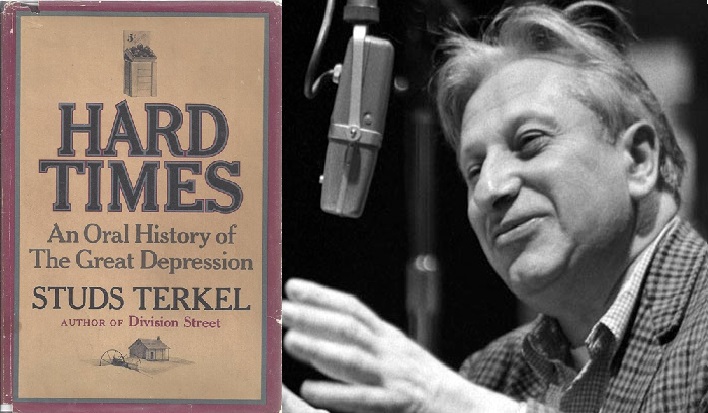|
| |
Studs Terkel, Hard Times: An Oral History of the Great Depression (1971)
Louis Terkel (1912-2008) was the son of Russian Jewish immigrants, and lived most of his life in Chicago, where his parents ran a ‘rooming house’ (offering rooms with shared kitchen and bathroom facilities – like students’ accommodation today) called the Wells-Grand Hotel. He was given the nickname ‘Studs’ after a character he portrayed in a play. Graduating as a lawyer in 1934, he went to work in radio, initially for the government’s Works Progress Administration. From 1952 the daily Studs Terkel Program on WFMT featured him interviewing people. He was passionate about oral history, and published collections of interviews on the Second World War and on Working, as well as Hard Times: An Oral History of the Great Depression (1971). Terkel's Hard Times is a classic on the Great Depression. The oral historian Michael Frisch (1979) found it: “moving, poignant, intense, human, instructive ... more depressing than anything else in its implications ... profoundly suggests the Depression’s destructive impact”. By contrast, the Saturday Review found it “a huge anthem in praise of the American Spirit”, and Newsweek claimed that “it will resurrect your faith in all of us”. ***
If you are faced with a quote from Hard Times in an interpretations question in your exam, you will need to assess its reliability on two levels:
1. Can I trust Studs Terkel?The general feeling (by default) seems to be ‘yes’. Many historians (and particularly textbooks) simply use quotes from Hard Times uncritically, as true. Summarising an article in the New York Times, Wikipedia comments: “Hard Times is known for providing an equal representation of experiences across a broad spectrum of socio-economic status, interviewing famous and influential people as well as others from a range of cultural and ethnic backgrounds,” And author of numerous young adult non-fiction books Siyavush Saidian calls Terkel “one of the most respected scholars and reporters of the Depression” (2017). However, you need to know that oral historians are less convinced. As was common at the time, Terkel edited and re-arranged his interviewees’ responses for effect, sometimes not always to the satisfaction of his interviewees. Michael Frisch (1979) was critical, citing Hard Times as an example of the way oral history is sometimes used to bypass proper historical interpretation, is often not very historical, and is “deeply conservative” in its nature (which last makes sense, given that most of Terkel’s interviewees would have been old people). If faced with a Terkel quote, questions you may wish to ask include:
It is important to remember that Terkel was not recording and publishing these interviewees because he wanted to convey an accurate history of the times, but because he believed passionately that his interviewees had a right to have their voices heard.
2. Can I trust the interviewee?The interviewees were recalling events 30 or 40 years previously. Nobody is accusing any of them of lying, but memories are notoriously unreliable:
Terkel does not care. He comments: “Their rememberings are their truths. The precise fact or the precise date is of small consequence. This is not a lawyer's brief nor an annotated sociological treatise. It is simply an attempt to get the story of the holocaust known as The Great Depression from an improvised battalion of survivors.”
|
Hard Times: An Oral History of the Great Depression is routinely quoted in books (especially textbooks) about people's experience of the Great Depression. • You can read the whole book here. • You can listen to some of the original recordings here. • There is a good summary here. |
|
| |
